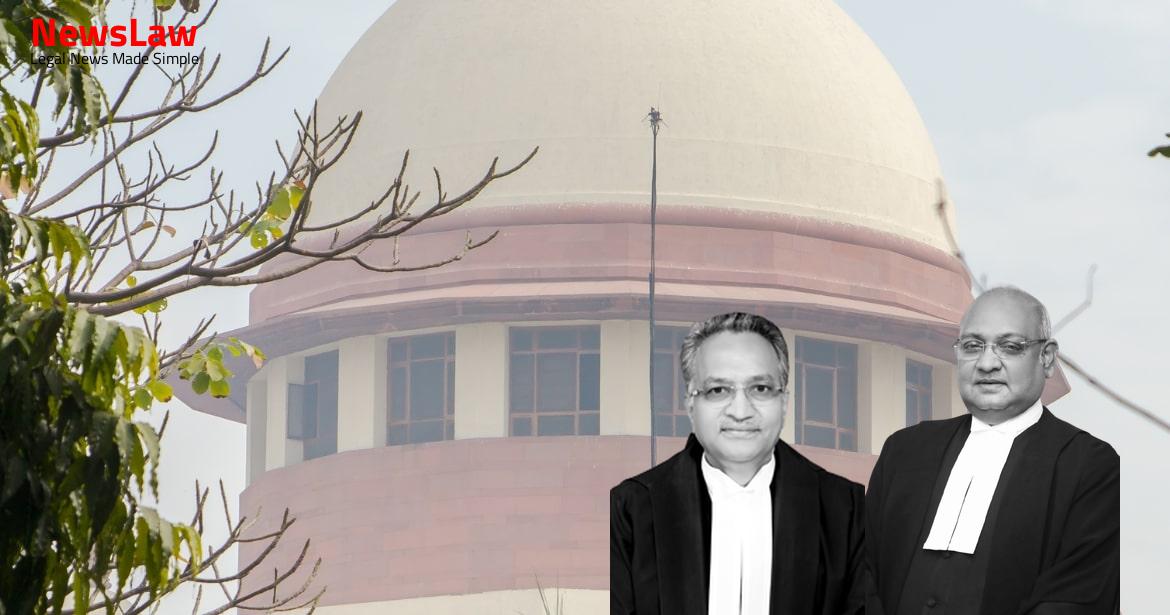In the case of State vs. Industrial Unit, the Court examined the jurisdiction and tax exemption dispute pertaining to sales transactions. The Real Party in Interest (RPC) argued lack of jurisdiction, but the Court rejected the claim after evaluating relevant case laws and legal provisions. Stay tuned to learn more about this significant case involving the State and an industrial unit.
Arguments
- Counsel for the appellant argued that the judgment only considered the situation covered under Section 6 of the Karnataka Sales Tax Act, 1957, while Section 5 of the Act deals with both sale and purchase.
- It was contended that purchase being part of the same sale, the benefit under the policy should be extended to purchase as well.
- The appellant’s industry being included in Appendix-IV was mentioned, but it was clarified that this did not change the substance of the policy.
- The inclusion of more industries in the amendment was noted as the purpose of the amendment.
- The appellant’s argument on delay in filing the appeals was also discussed.
Also Read: Land Acquisition Challenges for Integrated Infrastructure Project
Analysis
- A sale and purchase require transfer of property or agreement to transfer property for consideration of money payment or promise thereof.
- Industrial Policy, 1996 provides exemption only for sales tax, not for purchase tax.
- ‘Price’ defined in Sale of Goods Act as money consideration for the sale of goods.
- Constitution Bench decision in Devi Das Gopal Krishnan emphasized on the definitions of purchase and sale in the Principal Act.
- Purchase defined as acquisition of goods for cash, deferred payment, or valuable consideration excluding mortgage, hypothecation, charge, or pledge.
- Sale defined as transfer of property in goods for cash, deferred payment, or valuable consideration excluding mortgage, hypothecation, charge, or pledge.
- Sale of Goods Act, Section 4, defines a contract of sale of goods as a contract where the seller transfers or agrees to transfer property in goods to the buyer for a price.
- The clause in the Government Order dated 15-3-1996 provides an option for industrial investments to claim either sales tax exemption or sales tax deferral.
- A sale and purchase involve the same transaction – a transfer of property in goods for a price.
- The state law can levy tax at both the sale point and the purchase point.
- The power to classify objects or persons to be taxed or exempted lies with the legislature.
- The Industrial Policy only provides for sales tax concession and incentives, with ‘price’ being the ingredient of sale.
- The restriction in interpretation is necessary for the expressions ‘acquisition’ and ‘price’.
- The government order allows tiny, small-scale, medium, and large-scale industries to opt for sales tax exemption or deferment for a specified number of years.
- The expressions ‘sales tax’ and ‘sales tax deferral’ refer to tax exemption or delayed payment for certain industries.
- The Sales Tax Act applies only to sales as defined in the Act.
- The exemption notification issued by the State Government pertains to tax leviable on goods manufactured and sold by an industrial unit.
- The distinction between sale and purchase as different aspects of the same transaction is recognized.
- The State has the authority to levy tax at the sale point and/or at the purchase point.
- The principle expounded in the decision of Malnad (supra) is followed by the High Court.
- The expression ‘acquisition’ in clause (ff) of Section 2 of the Act means only ‘transfer’.
Also Read: Legal Interpretation of Mortgage Validity in Auction Dispute
Decision
- The RPC (Real Party in interest) argued that the judgment should be set aside due to lack of jurisdiction.
- The Court examined relevant case laws and legal provisions to determine jurisdiction.
- After careful consideration, the Court rejected the RPC’s argument and upheld the jurisdiction of the Court.
- Accordingly, all pending applications are also disposed of.
Also Read: Interpretation of Provisions in the 1946 Act: Jurisdiction of the CBI
Case Title: M/S HIGH RANGE COFFEE CURING PVT.LTD. Vs. THE STATE OF KARNATAKA (2020 INSC 131)
Case Number: C.A. No.-010680-010683 / 2011



